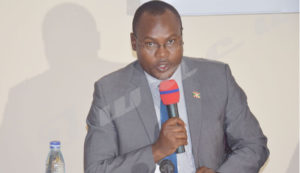Jean Baptiste Baribonekeza, Chairman of the National Commission for Human Rights dismisses the attitude of the civil society organizations that present their reports on human rights in Burundi directly to the UN Human Rights Council without respecting methodological approaches.

Jean Baptiste Baribonekeza: “CSOs and NGOs are reluctant to collaborate with the government during the production of reports on human rights”
“Civil society and Non-Governmental Organizations are reluctant to collaborate with the government during the production of reports on human rights.” He said that during an exchange session on international human rights mechanisms this May 29.
Baribonekeza has said the UN Human Rights Council receives three documents from the partner state, SCOs and NGOs. “All of them would be compiled in one reliable document,” says CNIDH Chairman before adding that Burundi has made significant improvements in human rights.
Jean de Dieu Mutabazi, Chairman of the National Observatory on Prevention and Eradication of Genocide, Crimes against Humanity and Other Crimes, says the government should impose effective measures aimed at discouraging CSOs and NGOs which directly present their reports to the UN Human Rights Council.
The same view is shared by Fabien Segatwa, a lawyer. He says the reports produced by different stakeholders such as CSOs and NGOs must first be presented to the Human Rights Ministry which would complement them.
David Ninganza from the local association defending the child’s rights-SOJPAE says the government would investigate the motives behind this direct presentation of reports to the UN Human Rights Council. “Effective strategies need to be used for a good collaboration”, he says.



















 IWACU Open Data
IWACU Open Data

